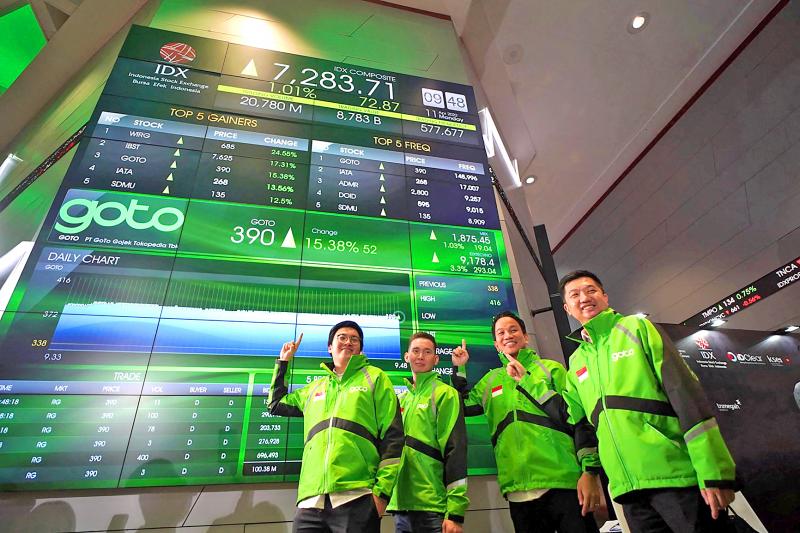US Federal Reserve hikes, decades-high inflation and COVID-19 lockdowns in China are only adding to investor bets that Southeast Asia’s stock markets could be one of the best places to park their money right now.
Buyers are touting an economic reopening and the region’s attraction as a hedge against higher commodity prices, which is helping the MSCI ASEAN Index break out of a three-year relative downtrend versus its global peer.
Foreign funds have been net buying Southeast Asia shares every month of this year, with total inflows of US$10 billion so far, data showed.

Photo: AFP
“There has definitely been a pickup in interest in ASEAN,” said Alexander Treves, head of investment specialists for Asia-Pacific equities at JPMorgan Asset Management.
Unencumbered by border restrictions in China and Japan, Southeast Asian economies are being supported by the revival of tourism, an industry which contributed 12 percent of their GDP in 2019, the World Travel and Tourism Council said.
Vacation bookings are rising as Thailand, Malaysia and Indonesia offer quarantine-free entry for vaccinated travelers, while Singapore has mostly returned to pre-pandemic life.
“Southeast Asian countries have all reopened with very little travel restrictions, so I think there should be a boost in tourism and consumption activity, especially as we head into the summer travel season,” said David Chao, global market strategist for Invesco Ltd in Hong Kong. “Southeast Asian risk assets look more attractive than North Asian equities.”
The region is an inflation hedge as the war in Ukraine pushes global commodity prices higher. Malaysia is a net oil exporter while Indonesia ships coal, palm oil and natural gas, among other goods, helping drive gains in related shares.
The Jakarta Composite Index is the best-performing major benchmark in Asia this year, up nearly 10 percent and hovering near a record high. The broader Southeast Asia gauge is on track to outperform the MSCI All Country World Index for a second straight quarter.
The outperformance has come despite the Fed kicking off an aggressive campaign of interest rate hikes, something that has weighed on the region’s assets in the past.
The effect of any policy tightening should at least seep through to earnings for financial firms, which make up almost 40 percent of the Southeast Asian benchmark.
Singapore and Indonesia have the region’s largest exposure to financials and “our view is particularly constructive on these two markets for the months ahead,” Deutsche Bank International Private Bank strategists wrote in a note last month.
Southeast Asian stocks also stand out as a haven with expensive US shares hit by rising rates and European stocks under pressure from the impact of the war in Ukraine.
International investors rotating out of China allocations “has indirectly benefited select Southeast Asian markets,” SC Asia global equities portfolio manager Sid Choraria said. “I expect this to continue as long as China concerns persist.”

Among the rows of vibrators, rubber torsos and leather harnesses at a Chinese sex toys exhibition in Shanghai this weekend, the beginnings of an artificial intelligence (AI)-driven shift in the industry quietly pulsed. China manufactures about 70 percent of the world’s sex toys, most of it the “hardware” on display at the fair — whether that be technicolor tentacled dildos or hyper-realistic personalized silicone dolls. Yet smart toys have been rising in popularity for some time. Many major European and US brands already offer tech-enhanced products that can enable long-distance love, monitor well-being and even bring people one step closer to

Malaysia’s leader yesterday announced plans to build a massive semiconductor design park, aiming to boost the Southeast Asian nation’s role in the global chip industry. A prominent player in the semiconductor industry for decades, Malaysia accounts for an estimated 13 percent of global back-end manufacturing, according to German tech giant Bosch. Now it wants to go beyond production and emerge as a chip design powerhouse too, Malaysian Prime Minister Anwar Ibrahim said. “I am pleased to announce the largest IC (integrated circuit) Design Park in Southeast Asia, that will house world-class anchor tenants and collaborate with global companies such as Arm [Holdings PLC],”

Sales in the retail, and food and beverage sectors last month continued to rise, increasing 0.7 percent and 13.6 percent respectively from a year earlier, setting record highs for the month of March, the Ministry of Economic Affairs said yesterday. Sales in the wholesale sector also grew last month by 4.6 annually, mainly due to the business opportunities for emerging applications related to artificial intelligence (AI) and high-performance computing technologies, the ministry said in a report. The ministry forecast that retail, and food and beverage sales this month would retain their growth momentum as the former would benefit from Tomb Sweeping Day

Thousands of parents in Singapore are furious after a Cordlife Group Ltd (康盛人生集團), a major operator of cord blood banks in Asia, irreparably damaged their children’s samples through improper handling, with some now pursuing legal action. The ongoing case, one of the worst to hit the largely untested industry, has renewed concerns over companies marketing themselves to anxious parents with mostly unproven assurances. This has implications across the region, given Cordlife’s operations in Hong Kong, Macau, Indonesia, the Philippines and India. The parents paid for years to have their infants’ cord blood stored, with the understanding that the stem cells they contained